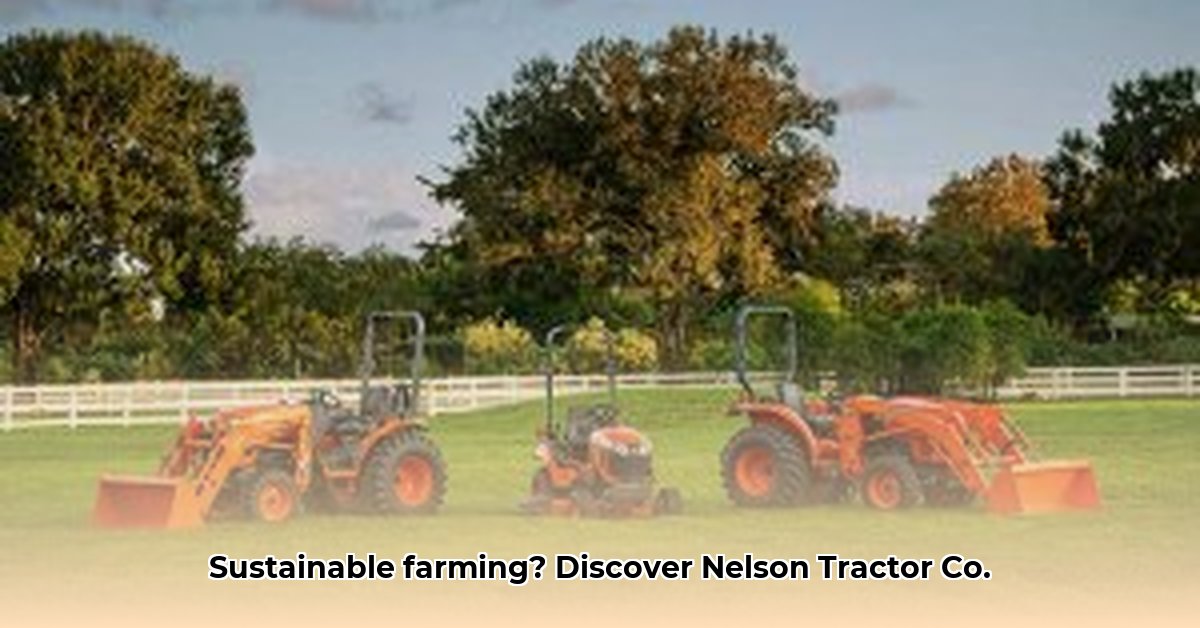
Nelson Tractor Co. in Jasper, Georgia, boasts a 75-year legacy of serving North Georgia farmers. But in an era demanding sustainable agricultural practices, how does this long-standing company contribute to a greener future? This case study explores Nelson Tractor's role in promoting sustainable farming, highlighting both its current contributions, and outlining actionable steps for enhanced impact. We'll examine equipment choices, operational strategies, and opportunities to optimize their contribution to environmental stewardship and the economic viability of local farms. For more information on agricultural equipment suppliers, check out this related resource.
Nelson Tractor Co.'s Impact on Sustainable Farming: A Deep Dive
Nelson Tractor's extensive network across North Georgia, encompassing communities like Blairsville and Dalton, provides convenient access to agricultural equipment. However, their impact extends beyond mere accessibility. The company’s long-standing presence provides a deep understanding of local farming challenges and the potential for environmentally conscious methodologies. But how effectively are they leveraging this understanding to promote sustainable practices?
How can Nelson Tractor further integrate environmentally friendly practices into their business model? This is a critical question, and the following analysis will examine the opportunities available.
Optimizing the Role of Equipment in Sustainable Agriculture
While Nelson Tractor's inventory includes diverse agricultural machinery, a comprehensive analysis of their sustainable equipment offerings is needed. Specific details regarding fuel-efficient engines, precision farming tools, and water-conservation technologies are currently lacking. This lack of readily available information presents a missed opportunity. By highlighting the eco-friendly features of their equipment – such as tractors with advanced fuel-saving technology – their commitment to environmental responsibility could be significantly amplified. This detailed information is crucial for attracting environmentally conscious farmers.
"The key to sustainable agriculture is not just about the tools you use, but your understanding of their environmental impact," says Dr. Emily Carter, Professor of Agricultural Engineering at the University of Georgia. "Farmers are looking for ways to reduce their carbon footprint, conserve water, and minimize chemical use. Dealerships that can provide this information will be critical partners in this endeavor."
Charting a Course Towards a Greener Future: Actionable Steps
To solidify their position as leaders in sustainable agriculture, Nelson Tractor needs to implement several key strategies. These improvements will not only enhance their environmental contribution but also significantly benefit the company’s long-term success.
For Nelson Tractor Co.:
Inventory Optimization: Conduct a thorough review of existing equipment, prioritizing models known for superior fuel efficiency, minimal chemical use, and efficient water management. Make this information prominently accessible to customers.
Enhanced Marketing: Develop comprehensive marketing materials – including engaging brochures, a revised website, and targeted social media campaigns – specifically highlighting the eco-friendly aspects of their equipment offerings.
Staff Training: Implement ongoing training programs focused on sustainable farming practices for all staff. Empowered, knowledgeable staff can provide farmers with more effective guidance on using environmentally friendly equipment and techniques.
Strategic Partnerships: Develop collaborative relationships with manufacturers specializing in eco-friendly agricultural equipment to ensure access to cutting-edge technologies.
For Local Farmers:
Actively seek information from Nelson Tractor about available sustainable equipment options. Increased farmer engagement will reinforce the importance of these offerings.
Embrace sustainable agricultural practices to improve environmental responsibility and enhance long-term farm viability.
For Regional Governments:
Implement financial incentives, such as grants or tax breaks, to stimulate the adoption of eco-friendly agricultural technologies.
Invest strategically in infrastructure improvements—especially advanced water management systems—to support the transition towards sustainable farming practices.
Navigating Challenges: A Practical Risk Assessment
Several challenges may hinder Nelson Tractor's transition towards enhanced sustainability. The following matrix outlines potential risks and mitigation strategies:
| Risk Factor | Likelihood | Impact | Mitigation Strategy |
|---|---|---|---|
| Limited availability of sustainable equipment | Moderate | High | Engage with eco-friendly manufacturers; consider pre-ordering popular models. |
| Insufficient staff knowledge | Moderate | Medium | Implement regular training and workshops focused on sustainable agricultural technologies. |
| Shifting farmer demands | Moderate | Medium | Conduct ongoing market research; maintain flexible inventory and adapt to changing needs. |
| Lack of government support | Low | Medium | Engage in advocacy; collaborate with agricultural organizations to lobby for increased support. |
A Collaborative Vision for a Sustainable Future
Ultimately, Nelson Tractor's success is inextricably linked to the prosperity of the North Georgia farming community. Embracing sustainable farming practices isn't just about minimizing environmental impact—it's about building a more resilient and prosperous agricultural future. This case study highlights the crucial role of collaboration among farmers, equipment dealers, and regional governments in achieving this shared vision. The journey toward sustainable agriculture requires the active participation of all stakeholders, and Nelson Tractor has the potential to lead the way.